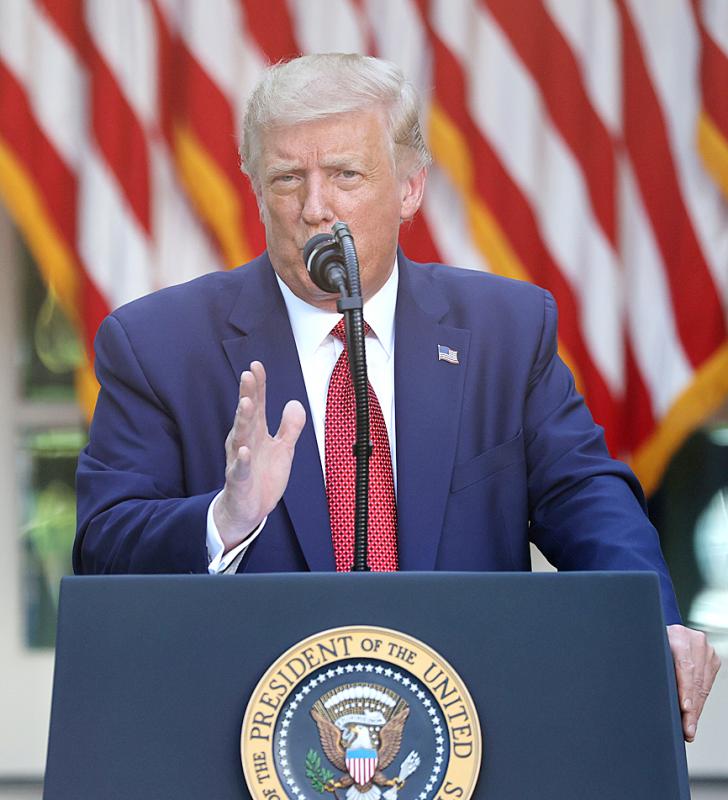US President Donald Trump on Tuesday stripped Hong Kong of preferential trade treatment and authorized sanctions on banks over China’s clampdown in the financial hub, infuriating Beijing, which vowed to retaliate.
In a discursive news conference dominated by attacks on his domestic rivals, Trump declared himself to be the toughest president ever on China, a country he is increasingly positioning as his nemesis ahead of the US presidential election in November.
Trump announced that he had issued an executive order on Hong Kong as he predicted decline for the territory, on which Beijing recently imposed tough national security legislation.

Photo: Reuters
“Hong Kong will now be treated the same as mainland China — no special privileges, no special economic treatment and no export of sensitive technologies,” Trump said in the Rose Garden at the White House.
“Their freedom has been taken away; their rights have been taken away, and with it goes Hong Kong, in my opinion, because it will no longer be able to compete with free markets. A lot of people will be leaving Hong Kong,” Trump said.
Trump also said that he had signed into law the Hong Kong Autonomy Act, which authorizes sanctions against Chinese officials and Hong Kong police seen as infringing on the territory’s autonomy — and, crucially, any banks that make significant transactions with them.
Lawmakers hope the new law will force all but provincial Chinese banks to choose between abetting Beijing’s efforts in Hong Kong, or being able to conduct transactions in US dollars and operate in the world’s largest economy.
“This law gives my administration powerful new tools to hold responsible the individuals and the entities involved in extinguishing Hong Kong’s freedom,” Trump said.
China yesterday vowed to retaliate, saying that the act “maliciously slanders” its legislation in Hong Kong.
“China will make necessary responses to protect its legitimate interests, and impose sanctions on relevant US personnel and entities,” the Chinese Ministry of Foreign Affairs said.
The White House acknowledged concerns that the act, a tougher follow-up to a law last year, limits the president’s leeway to waive sanctions.
However, the act enjoyed overwhelming bipartisan support, meaning that the US Congress could likely override any presidential veto.
“Today, the United States made clear to China that it cannot continue its assault on freedom and human rights in Hong Kong without severe repercussions,” said US Senator Chris Van Hollen, a Democrat who spearheaded the law.
“The Chinese government’s aggression merits this swift rebuke,” he said.

NO HUMAN ERROR: After the incident, the Coast Guard Administration said it would obtain uncrewed aerial vehicles and vessels to boost its detection capacity Authorities would improve border control to prevent unlawful entry into Taiwan’s waters and safeguard national security, the Mainland Affairs Council (MAC) said yesterday after a Chinese man reached the nation’s coast on an inflatable boat, saying he “defected to freedom.” The man was found on a rubber boat when he was about to set foot on Taiwan at the estuary of Houkeng River (後坑溪) near Taiping Borough (太平) in New Taipei City’s Linkou District (林口), authorities said. The Coast Guard Administration’s (CGA) northern branch said it received a report at 6:30am yesterday morning from the New Taipei City Fire Department about a

IN BEIJING’S FAVOR: A China Coast Guard spokesperson said that the Chinese maritime police would continue to carry out law enforcement activities in waters it claims The Philippines withdrew its coast guard vessel from a South China Sea shoal that has recently been at the center of tensions with Beijing. BRP Teresa Magbanua “was compelled to return to port” from Sabina Shoal (Xianbin Shoal, 仙濱暗沙) due to bad weather, depleted supplies and the need to evacuate personnel requiring medical care, the Philippine Coast Guard (PCG) spokesman Jay Tarriela said yesterday in a post on X. The Philippine vessel “will be in tiptop shape to resume her mission” after it has been resupplied and repaired, Philippine Executive Secretary Lucas Bersamin, who heads the nation’s maritime council, said

REGIONAL STABILITY: Taipei thanked the Biden administration for authorizing its 16th sale of military goods and services to uphold Taiwan’s defense and safety The US Department of State has approved the sale of US$228 million of military goods and services to Taiwan, the US Department of Defense said on Monday. The state department “made a determination approving a possible Foreign Military Sale” to the Taipei Economic and Cultural Representative Office in the US for “return, repair and reshipment of spare parts and related equipment,” the defense department’s Defense Security Cooperation Agency said in a news release. Taiwan had requested the purchase of items and services which include the “return, repair and reshipment of classified and unclassified spare parts for aircraft and related equipment; US Government

More than 500 people on Saturday marched in New York in support of Taiwan’s entry to the UN, significantly more people than previous years. The march, coinciding with the ongoing 79th session of the UN General Assembly, comes close on the heels of growing international discourse regarding the meaning of UN Resolution 2758. Resolution 2758, adopted by the UN General Assembly in 1971, recognizes the People’s Republic of China (PRC) as the “only lawful representative of China.” It resulted in the Republic of China (ROC) losing its seat at the UN to the PRC. Taiwan has since been excluded from